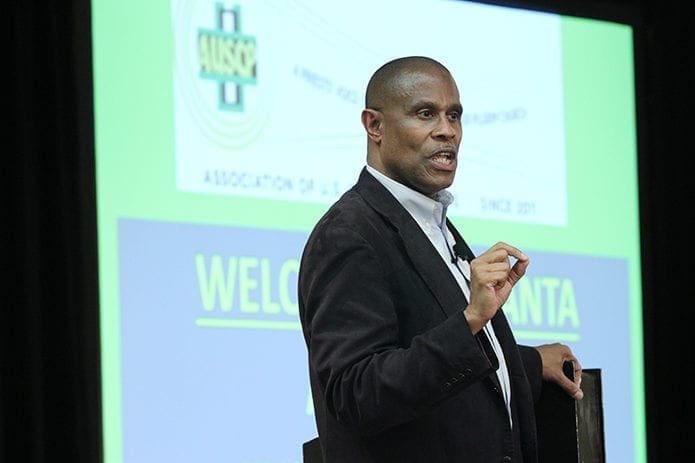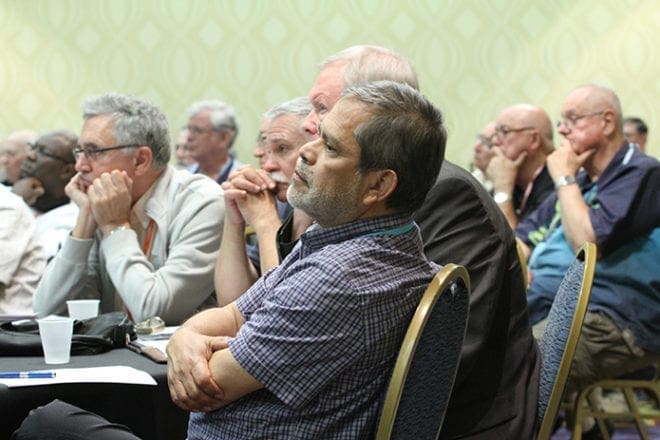 Photo By Michael Alexander
Photo By Michael AlexanderAtlanta
Priests’ assembly reflects on need to heal ‘deep malady’ in American soul
By ANDREW NELSON, Staff Writer | Published July 7, 2017
ATLANTA—In the face of an abiding “soul sickness” in the United States, the Catholic Church can serve as a counterbalance to forces of violence and hatred, keynote speaker Father Bryan Massingale told a June gathering of priests in Atlanta.
His message, inspired by the vision of Dr. Martin Luther King Jr. about America, was shared with approximately 170 priests from across the country. They spent June 19-22 in discussion and prayerful reflection at a gathering of the Association of U.S. Catholic Priests. The theme of the assembly was “Peacemaking in our Fractured Society.”
Father Massingale, professor of theological and social ethics at Fordham University in New York City and author of “Racial Justice and the Catholic Church,” was the first African-American priest ordained for the Archdiocese of Milwaukee in 1983. He offered pointed observations about the racial climate in the country.
“Something catastrophic is happening in our country. There is a deep malady at the soul of America,” he said.
Racism is a “soul sickness” that plagues the United States still, he said, drawing upon the insights of King.
The visible structures of segregation that oppressed African-Americans have lifted, but “underneath the visible” there are values that shape how people live and what they value.
Father Massingale said he noticed the ambivalence in how people reacted to the shooting of unarmed black individuals by police. He recalled reactions he observed after the police shooting of 12-year-old Tamir Rice, who was at a Cleveland playground with a toy pellet gun when he was killed.
When the news was reported, Father Massingale said travelers at a New York City airport were glued to the TV, but the looks were “cold and stony.”
“They could not empathize with a parent’s grief. They could not empathize with a life taken too soon,” he said.
Just before the conference opened, a jury acquitted a Minnesota police officer in the shooting death of Philando Castile, a black motorist pulled over for a traffic violation, who was killed after advising the officer he had a legal firearm in his car. The aftermath was streamed live on Facebook by Castile’s girlfriend. A young child was also in the car.
At the assembly, Castile’s image was included in a silent visual display of more than a dozen African-American men and women killed, including nine slain at Mother Emanuel African Methodist Episcopal Church, in Charleston, South Carolina, by an avowed white supremacist.
“Work on the deeper things”
Those issues also came to the surface in the 2016 presidential election, according to Father Massingale.
The campaign of President Donald Trump “found a way to tap into deep American fears,” he said.
The president is the “unacknowledged shadow of us,” said Father Massingale, a doctor of sacred theology.
He said, however, that if the president had not been elected or did not continue in office that would not be an answer. Another person or crisis will come along until people confront and resolve this deep-seated malady, he said.
What shapes the nation also shapes the church, he said. For the faith community, it isn’t enough to focus on the Catechism of the Catholic Church and canon law, he said.
Instead, believers need to remember the goal of a Christian is living as a “joyful witness of passionate charity,” he said, quoting retired Pope Benedict XVI’s encyclical “Deus Caritas Est.”
“If we take this seriously, it takes us on a journey of conversion as well,” Father Massingale said. “Part of what’s cool about being Catholic is we have brothers and sisters who don’t look like us. They are still part of us.”

Father Victor Reyes, center, pastor of Our Lady of La Salette Church, Canton, sits among his brother priests as they listen to Father Bryan Massingale’s June 19 talk. Some 170 priests attended the Association of U.S. Catholic Priests’ sixth annual assembly, where the theme was “Peacemaking In Our Fractured Society.” Photo By Michael Alexander
The Association of U.S. Catholic Priests was founded six years ago. Its website calls the organization the largest association of priests in the United States.
JustFaith founder Jack Jezreel and Archbishop Wilton D. Gregory also spoke at the conference, which included time to explore civil rights history in Atlanta. Savannah Bishop Gregory Hartmayer, OFM Conv., led a retreat for priests who arrived before the conference opened.
Father Bob Bonnot, a priest of the Diocese of Youngstown, Ohio, and chairman of the leadership team, said the racial tensions in the country and peacemaking in communities drove the conference’s agenda.
“If we don’t work on the deeper things, it’ll show up in some other way. We have a responsibility to work on the soul of America,” he said.
Father Bryan Small, pastor of Sts. Peter and Paul Church, Decatur, who attended the assembly, said priests and their parishioners can live in “comfortable bubbles” that keep the lives of people different from themselves at a safe distance. They may very well believe racism doesn’t exist because it doesn’t in their world, he said.
“We don’t find the risen Christ in our comfort levels,” he said.
A recent poll by Public Religion Research Institute revealed a gap among Catholics by race and ethnicity about the level of discrimination faced by black people. Sixty-five percent of Hispanic Catholics said there was a lot of discrimination, while 47 percent of white Catholics agreed with this conclusion.
Father Jim Murphy, of the Diocese of Madison, Wisconsin, said the exploration of the “shadow” of American culture was unique. He said the church must do more to “diminish the idea of the stranger and the other.”
“Intermittent peace between atrocities”
The organization later presented its St. John XXIII Award to Father Massingale “for his tireless efforts to create a world where the dignity of each person is respected and protected,” and to Father Richard Rento, a priest for 58 years in the Diocese of Paterson, New Jersey, “for his dedication to priestly life and pastoral service, and for the pastoral wisdom he has embodied and exercised in his ministry, preaching and writing.”
Speaking to the room of priests, Father Massingale urged them to be spiritual leaders to people in need.
“We don’t have the luxury of going into despair. Our people need us,” he said. “They need a prophetic word from us, now more than ever before.”
He encouraged them to examine the fractures and “speak a word that is healing.”
“God either loves all of us or none of us has a claim on God’s mercy,” he said.
In a talk on the second day of the conference, Archbishop Gregory cautioned that, in preparing his talk, his points could have been overtaken by new bloodshed.
“We live in a world punctuated by intermittent peace between atrocities that explode without warning,” he said.
He urged the ministers to engage people, communities and issues before a crisis arrives.
“Words from the heart and those meant to change our hearts are important not just after a horrible event, but even more so before such events take place,” he said.
He decried what he called the “post-polite” world where hate speech contributes to “a deterioration of the common good.”
Instead, Archbishop Gregory said the culture is in need of “a moment of human empathy that helps us all understand the futility of violence of all types—verbal, physical, emotional and social.”
And the church needs to serve as witness for the common good and social decency.
“We must become the counterbalance … by becoming the voices of reason and civility,” he said. “We don’t need a pause in hostilities—we need a conversion of hearts which the Lord called his disciples to embrace and promote.”
He saluted Gandhi, King, St. Teresa of Kolkata and Malala Yousafzai, an Afghan woman and education advocate who received the Nobel Peace Prize, for striving to change society by “challenging human hearts.”
“Their devotion to changing hearts remains a model for all those who are called to work for peace in our world,” he said, adding the women and men come from different religious backgrounds but share a “similar vision of peace.”
“Jesus calls us to seek peace that begins within the human heart and results in the transformation of the hardness and obstinacy that constrict the compassion and mercy for which the human heart was designed—and we have never needed it more than we do today. We all need to help it happen as a constitutive part of our ministry and mission.”